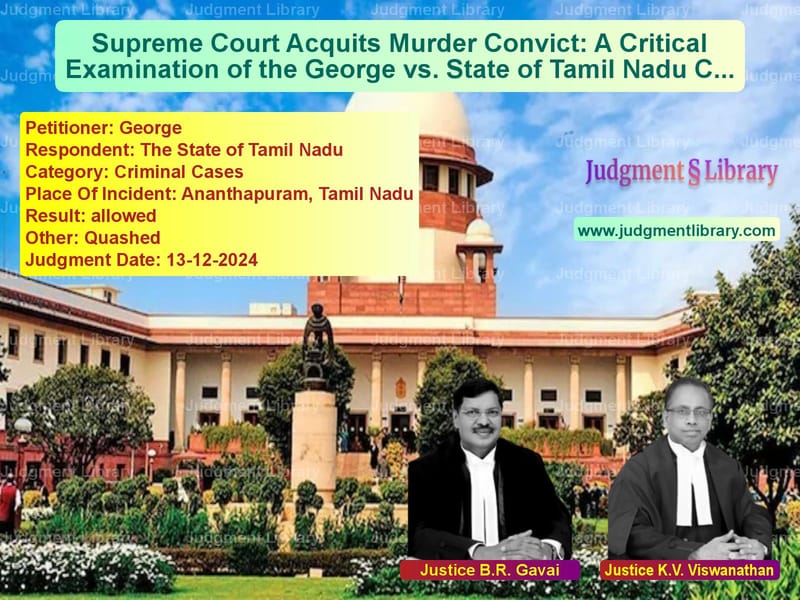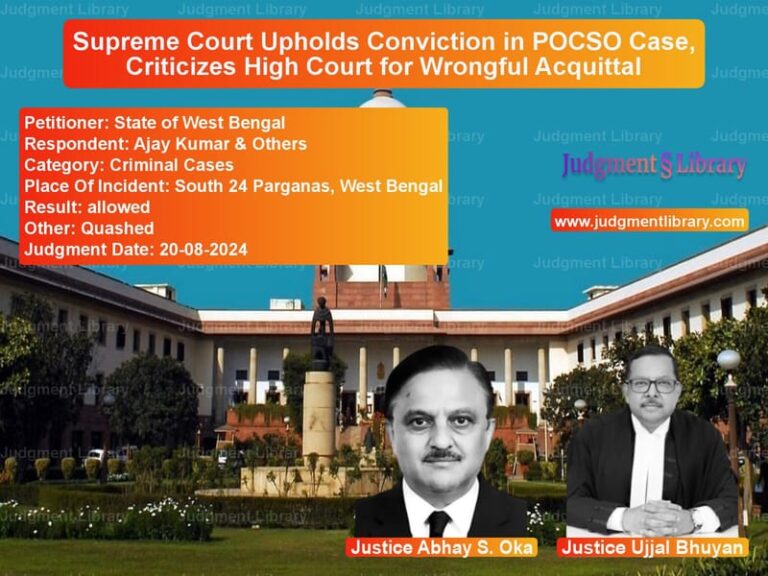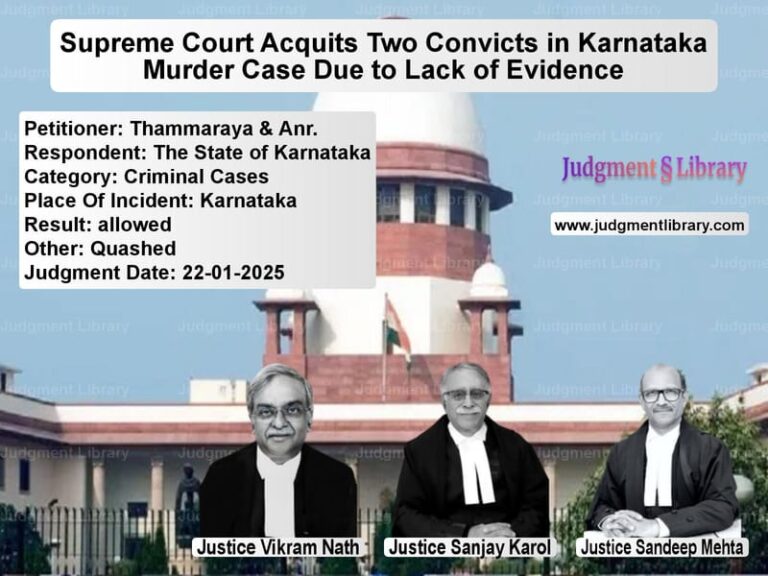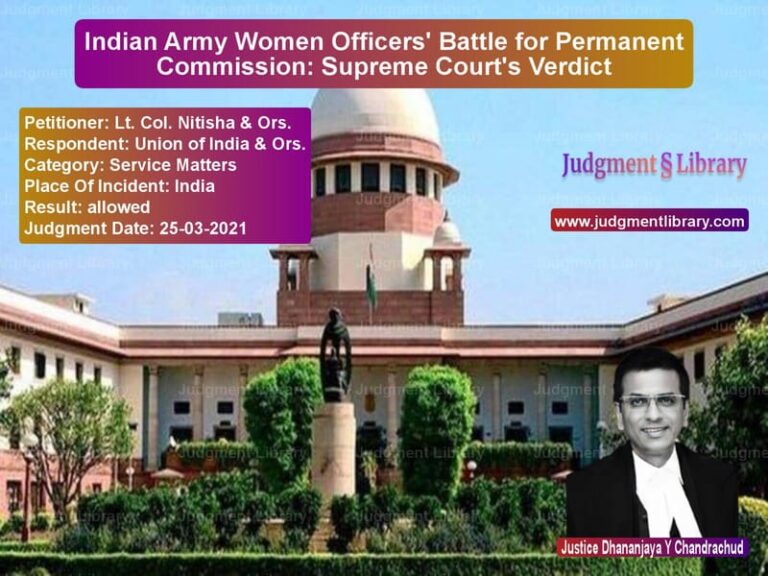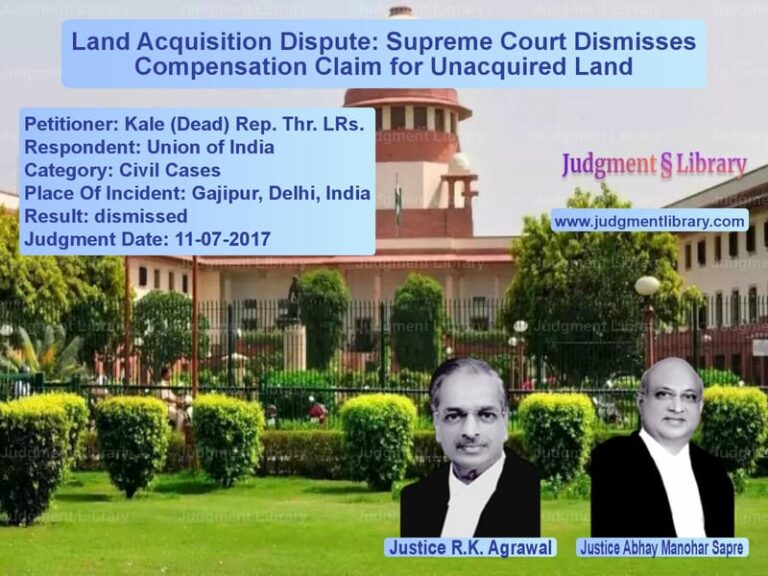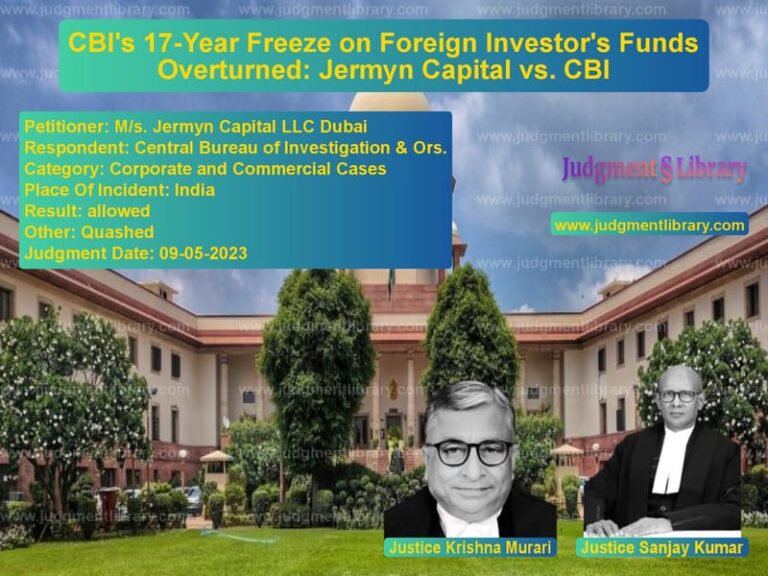Supreme Court Acquits Murder Convict: A Critical Examination of the George vs. State of Tamil Nadu Case
The Supreme Court of India, in a landmark judgment, acquitted the accused George, who had been previously convicted of murder under Sections 294(b), 341, and 302 of the Indian Penal Code (IPC). This case, which originated in 2015, went through several judicial phases before the apex court overturned the High Court’s verdict. The judgment is significant in its approach to evaluating eyewitness testimony, circumstantial evidence, and the principles of criminal jurisprudence.
Background of the Case
The case has its roots in a dispute within the Christian community of Ananthapuram, Tamil Nadu. The prosecution alleged that George, along with two others, attacked and murdered Praveen Kumar in the early hours of May 16, 2015. The altercation was reportedly linked to church election disputes. The trial court convicted George based on the testimony of a sole eyewitness, Kovilraj (PW-1), who was the father of the deceased. While the Madras High Court upheld George’s conviction, it acquitted the other two accused. The Supreme Court’s decision to overturn the conviction brings attention to inconsistencies in witness testimony and procedural irregularities.
Incident Details
According to the FIR filed by Kovilraj (PW-1), the incident took place on the night of May 15-16, 2015. Praveen Kumar, the deceased, was standing outside the Immanuel Church in Ananthapuram with friends when George and his co-accused arrived. They reportedly abused him and questioned his presence at the church event, citing prior electoral conflicts. When Praveen Kumar retorted, George allegedly brandished a knife. The deceased attempted to flee but was chased down, held by the other accused, and ultimately stabbed by George. He succumbed to his injuries at the hospital.
Trial Court Proceedings
The trial court, after evaluating the evidence, convicted George and sentenced him to life imprisonment. The key evidence relied upon by the prosecution included:
- The testimony of Kovilraj (PW-1), the father of the deceased, who claimed to have witnessed the crime.
- The recovery of a knife allegedly used in the murder, based on George’s confession.
- The medical report, which confirmed that the injuries were consistent with a stabbing attack.
Based on these factors, the trial court found George guilty of murder and related offenses.
High Court’s Observations
When the case was appealed before the Madurai Bench of the Madras High Court, the court partially allowed the appeal. The High Court found inconsistencies in the witness testimony and acquitted the co-accused, citing insufficient evidence against them. However, it upheld George’s conviction based on the same testimony that it had deemed unreliable for the other accused. This inconsistency formed one of the primary grounds for the Supreme Court’s review.
Supreme Court’s Analysis
The Supreme Court, in its detailed examination, focused on the following aspects:
1. Inconsistency in Witness Testimony
The Supreme Court noted that the testimony of PW-1 was found unreliable for the co-accused but was still used to convict George. This selective acceptance of evidence was deemed unfair.
2. Distance from the Crime Scene
The incident took place 300 meters away from the church, raising doubts about whether PW-1 could have accurately witnessed the attack, especially under nighttime conditions.
3. Lack of Corroborative Evidence
There was no forensic or independent corroboration of George’s involvement beyond the contested eyewitness testimony.
4. Flaws in the Knife Recovery Process
The alleged weapon was recovered from an open area accessible to the public, weakening its evidentiary value.
Key Judicial Observations
The Supreme Court bench, comprising Justices B.R. Gavai and K.V. Viswanathan, remarked:
“When the High Court comes to a conclusion that it is difficult to believe that Kovilraj (PW-1) could have witnessed the incident in the manner narrated by him and granted benefit of doubt to accused Nos.2 and 3, the conviction of accused No.1 on the basis of the evidence of the very same witness only on the basis of conjectures and surmises, in our view, is not permissible.”
Additionally, the court emphasized that an interested witness, such as the father of the deceased, requires higher scrutiny to prevent miscarriage of justice.
Final Judgment
The Supreme Court ruled:
- The appeal was allowed.
- The High Court’s conviction order was quashed.
- George was acquitted of all charges.
- Immediate release was ordered.
Implications of the Judgment
This case underscores several critical principles in criminal jurisprudence:
- Importance of Consistency in Witness Testimony: Selective acceptance of evidence can lead to unfair judgments.
- Reliability of Sole Eyewitness Accounts: Courts must corroborate such testimonies with independent evidence.
- Proper Admissibility of Recovered Weapons: Recovery from an open space dilutes evidentiary value.
Conclusion
The Supreme Court’s verdict in George vs. State of Tamil Nadu highlights the necessity of consistency and caution in criminal trials. By setting aside an unjust conviction, the court reaffirmed the principles of fairness and due process, ensuring that justice prevails over procedural lapses and selective interpretations of evidence.
Petitioner Name: George.Respondent Name: The State of Tamil Nadu.Judgment By: Justice B.R. Gavai, Justice K.V. Viswanathan.Place Of Incident: Ananthapuram, Tamil Nadu.Judgment Date: 13-12-2024.
Don’t miss out on the full details! Download the complete judgment in PDF format below and gain valuable insights instantly!
Download Judgment: george-vs-the-state-of-tamil-n-supreme-court-of-india-judgment-dated-13-12-2024.pdf
Directly Download Judgment: Directly download this Judgment
See all petitions in Murder Cases
See all petitions in Bail and Anticipatory Bail
See all petitions in Custodial Deaths and Police Misconduct
See all petitions in Judgment by B R Gavai
See all petitions in Judgment by K.V. Viswanathan
See all petitions in allowed
See all petitions in Quashed
See all petitions in supreme court of India judgments December 2024
See all petitions in 2024 judgments
See all posts in Criminal Cases Category
See all allowed petitions in Criminal Cases Category
See all Dismissed petitions in Criminal Cases Category
See all partially allowed petitions in Criminal Cases Category

